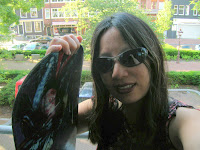The burping and belching is still driving me mad. During Cycle 1, after spending all day googling on the search terms "burping", "belching", or "gas" plus "chemo" and "cancer", I didn't come up with much of anything useful, except a few community forum posts that indicated that I wasn't the only one who was perplexed by this not-often-mentioned side effect of chemotherapy.
On one thread, someone posted that he noticed that his mother burped continuously during her treatment period and was curious as to why, which provoked indignant responses like: "your mother has cancer and you're worried about burping?!" To this I would reply, it's hard to feel normal when your body does things it doesn't normally do. Plus, as I mentioned in an earlier post, the burping makes nausea worse.
My brother suggested over-the-counter Maalox, but that didn't work. Then I told my doctor, and he prescribed a powerful proton pump inhibitor called Pantecta (pantoprazole) to use in combination with the anti-emetics during Cycle 2. That didn't work either. In fact, I'm 90% sure it caused me to have severe heart palpitations (listed as a possible side effect for < 2% of the population), because I didn't have heart palpitations during Cycle 1, and they stopped almost immediately after I stopped taking Pantecta.
Then, I happened to be reading an website article on improving digestion and stumbled upon a few sentences about hypochlorhydria:
"Low stomach acid (hypochlorhydria) is common, especially in older people since as we age, we make less stomach acid. Research suggests that as many as half of the people over 60 years old have hypochlorhydria. A variety of factors can inhibit sufficient stomach acid production including the pathogenic bacteria, Helicobacter pylori, and frequent use of antacids. Hypochlorhydria is also associated with many diseases, such as asthma, celiac sprue, hepatitis, rheumatoid arthritis, osteoporosis, and diabetes mellitus. Signs of hypochlorhydria include a sense of fullness after eating, bloating, excessive belching, indigestion, multiple food allergies, undigested food in the stool, and peeling and cracked fingernails."
Bingo! I had almost every symptom listed to some degree.
After further investigation on the net, I discovered:
1) Hypochlorhydria is often misdiagnosed by doctors who almost always jump to the conclusion that antacids should be prescribed, which would only make the problem worse!
2) Burping can be a serious problem because it's a sign that the body is not capable of breaking food down into its component nutrients; you can eat all you want and still be starving and undernourished. I felt especially frustrated when reading this, because I had been spending so much time researching nutrition and preparing healthy food to eat, only to learn that most of it is just being flushed down the toilet!
3) Hypochlorhydria is a well-known side effect of proton pump inhibitors. After still more research, I discovered that proton pump inhibitors are recommended to mitigate some of the side effects of CHOP chemotherapy. But as far as I know, I hadn't been taking any proton pump inhibitors except for Pantecta, which I only took after I already experienced burping.
More detective work revealed that it is possible to self-diagnose hypochlorhydia by performing a challenge test with hydrochloric acid. In fact, the challenge test would also determine the appropriate treatment dosage for my level of stomach acid deficiency. Perfect.
The local Bio-Markt (Holland's version of Whole Foods Market) didn't have any hydrochloric acid in stock, but they offered to order HCl Plus by Biotics Research for me. This is a combination pill of HCl, pepsin (to simulate the body to produce HCl naturally), and Vitamin B12 (because persons with low stomach acid are always deficient in B12).
I still haven't tried the challenge test yet, but I plan to do it soon. It would be amazing to have this mystery solved!
***********
It's now a few days later and I've started taking HCl with every meal, but frankly: I can't tell whether it's working. I just read on the internet that one person took many pills, didn't feel any burning, but later got tested for stomach acid and found out that his level was normal. I don't feel any burning when I take one pill; I'm still burping, but I'm afraid to take more and end up with a self-created ulcer. So on Wednesday when I go in for my next consult, I'll see whether I can persuade my doctor to check my stomach acid level. I am now afraid to take anything for fear that my problem will worsen, but I'd really like to make these side effects go away for good.
Subscribe to:
Post Comments (Atom)




Hi, so what was the result of continuous use of HCI did it help to remedy the burping? My mum's just finished her course of Chemo and like yourself after every Chemo session she suffers from a serious case of burping for a couple of weeks.
ReplyDeleteWe would really appreciate some advice.
Kind regards
Asif